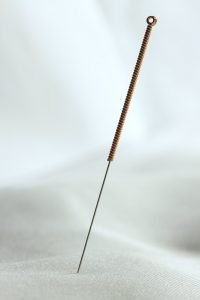A background to acupuncture
To get an understanding of acupuncture, we need to look at its background.
Its roots go back a long way. In fact, over 2000 years. It was first practiced in China. The early form comes from the concept of ‘Qi’ energy.
It stemmed from a belief that there are lines of meridians that run around the body. They believed that energy blockages create pain and disease. And that, restoring the flow of energy helped to improve health and relieve pain.
Thus, with its long history, it clearly has a very well-established tradition. However, it didn’t arrive in Europe until the 17th Century. At that time, it was popular in France and Germany. It was lesser-known in Britain.
However, it has grown in prominence over recent years in the UK. This is due to its western-scientific approach to the practice. In addition, acupuncture is becoming increasingly well researched.
Understanding how acupuncture works?
Acupuncture incorporates the use of very fine needles, and a certified professional place them in sites around the body. These sites are known as acupuncture points. They stimulate sensory nerves under the skin and in the muscles.
Subsequently, this releases a flow of endorphins (‘feel-good’ hormones). They play a central role in pain relief. The impact of the treatment is cumulative. A series of acupuncture is almost certainly more beneficial than a single session.
Acupuncture is now more widely used. It is used within many GP surgeries, Pain Management Centres and even hospices. This growth helps to emphasize its growth in acceptance.
Understanding some myths about acupuncture
Firstly, and perhaps most importantly, the idea that it is painful. This may seem like a legitimate concern. After all, having needles stuck in you does sound painful. But the needles used are incredibly thin. About the same width as a hair. So no, acupuncture is not painful.
The next myth to dispel is that acupuncture is just for pain management. It is often used for relief from acute physical pain. However, it has proved successful for many other conditions too.
Crucially, it seems to have a positive impact on mental and emotional wellbeing. And it helps to deal with insomnia, anxiety, depression, and even infertility.
Lastly, we need to get rid of the idea that acupuncture is unhygienic. In fact, the opposite is true. The needles used are sterilized and used on a one-off basis. You are not under any risk of infection from acupuncture.
Can you trust acupuncture?
Yes, you can. Acupuncture is shaking off its image. It is no longer seen as a quirky alternative therapy. The National Institute for Clinical Excellence (NICE) even recognize it. They even recommend it for chronic tension-type headaches. And, in addition, to help relieve joint, post dental crowns procedure or post-operative pain.
We hope this information is useful for you. If you need advice or have any questions about our treatments, please contact us. You can find us in Mill Hill Broadway and Islington. We are always happy to help. If you like this blog, please share!




